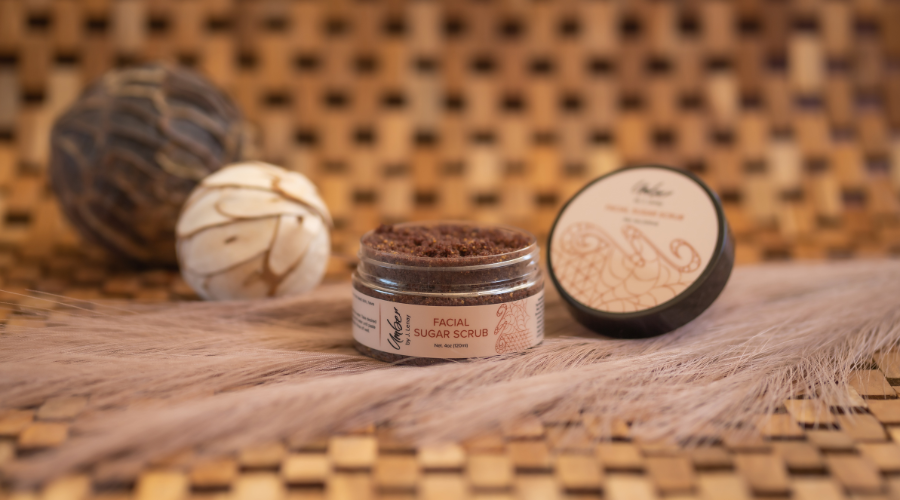You know how your skin changes with the seasons, but does your skincare routine? The changing weather can wreak havoc on your complexion if you don’t adapt. As the temperature drops, your skin gets drier. When it heats back up, oil production skyrockets.
Either extreme calls for exfoliation adjustments. It’s time to take your seasonal skincare as seriously as your wardrobe. In this article, we’ll explore how to tweak your trusty sugar scrub routine for the season at hand. We’ll cover how to combat flakiness in winter, control shine in summer, and everything in between. Read on to learn how seasonal sugar scrub facials can restore glow and balance year-round.
How the Changing Seasons Affect Your Skin
As the seasons change, so does your skin. Colder weather means lower humidity, which sucks moisture from your skin and can leave it feeling dry and itchy.
Dry, chapped skin
The cold, dry air during fall and winter draws moisture away from your skin, causing dryness, flaking, and irritation. Exfoliating removes the dead, flaky skin so moisturizer can absorb better and soothe your parched skin.
In winter, be gentle and exfoliate 1-2 times a week. Use a fine-grained scrub, like sugar, and follow up with a rich moisturizer to replenish hydration.
Increased oil production
When the weather warms up in spring and summer, your skin produces more oil to compensate for the increased humidity. Exfoliation helps unclog pores and prevents breakouts by removing excess oil and dead skin cells.
When it’s warm, you may want to exfoliate 2-3 times a week using your scrub to deeply cleanse pores. You may also incorporate a facial scrubber for extra exfoliation in your daily skincare routine.
When you’re done exfoliating, use a lighter moisturizer to avoid clogging pores.
Should you exfoliate more in the summer or winter?
Deciding whether to exfoliate more in the summer or winter largely depends on your individual skin type and how it reacts to the changing seasons.
In the summer, increased humidity and higher temperatures can lead to more sweat and oil production, which can cause dead skin cells to stick to the skin's surface. Exfoliating can help prevent clogged pores and breakouts, keeping the skin clear and helping to remove any buildup of sunscreen and sweat that occurs more frequently during these warmer months.
On the other hand, during winter, the air is typically drier, and indoor heating can strip moisture from the skin, leading to dryness and flakiness. Exfoliation can help remove the buildup of dead skin cells that contribute to a dull complexion and allow moisturizers to penetrate more effectively, helping to combat dryness.
However, it's important to be cautious not to over-exfoliate, as this can lead to skin irritation and damage no matter the season. You should adjust your exfoliation routine based on how your skin feels and reacts. If your skin becomes dry or irritated, it may be necessary to exfoliate less frequently or switch to a gentler exfoliation method. Always follow up with a good moisturizer to maintain skin hydration.
Listening to your skin and modifying your exfoliation routine in response to seasonal changes and skin's needs is the best approach. If you have specific concerns or a skin condition, it's always wise to seek advice from a dermatologist who can provide guidance tailored to your skin type.
The Importance of Exfoliation for Healthy, Glowing Skin
Exfoliation removes the dead skin cells from the surface of your skin, leaving you with smoother, brighter skin. During seasonal changes, exfoliation becomes even more important as your skin reacts to fluctuations in temperature and humidity.
Keep Your Skin Smooth
As the seasons change, your skin can become dry and flaky. Exfoliation buffs away the dead and dulling skin cells to leave your skin feeling smooth and soft. Gently massage the sugar scrub onto your face using small circular motions, then rinse well with warm water. Your skin will feel fresh and silky.
Allow for Better Absorption
By removing the dead cell barrier, exfoliation allows your skin care products to better absorb into your skin. This means that your moisturizers, serums and treatments can work more effectively. Exfoliate 1-2 times a week, and you'll notice your skin care regimen making a bigger difference.
Promote Collagen Production
Gentle exfoliation encourages your skin to produce more collagen, the protein responsible for skin firmness and elasticity. As you age, collagen production slows down, so exfoliation is key to maintaining a youthful glow. The sugar in the scrub also contains glycolic acid, an alpha hydroxy acid that boosts collagen synthesis.
Brighten Your Complexion
Dull and uneven skin tone can be caused by built-up dead skin cells. By sloughing them away, exfoliation helps to fade dark spots and brighten your complexion. It also smooths rough skin patches and minimizes the appearance of large pores. For the most radiant skin, exfoliate before applying your vitamin C serum or brightening mask.
Exfoliation is such an important part of any skincare routine, but especially during the seasonal changes. By keeping your skin smooth, promoting absorption of products, encouraging collagen production and brightening your complexion, exfoliation with a sugar scrub will give you a gorgeous glow all year round.

How do you exfoliate your skin?
Exfoliating your skin is an essential step towards a clear and vibrant complexion, as it helps to remove dead skin cells that can clog pores and cause dullness.
To exfoliate, begin by choosing an exfoliant that suits your skin type—be it a gentle scrub or an exfoliating tool like a brush or sponge. Dampen your skin with warm water to soften the skin's surface, then apply your chosen exfoliant, using small, circular motions to massage it gently across the face. This action helps to lift and remove dead skin cells and other debris from your skin.
Be careful not to scrub too hard, as this can cause irritation. After thoroughly working the exfoliant into your skin, rinse with lukewarm water and pat your face dry with a clean towel. Finish by applying a moisturizer to hydrate and protect your newly smoothed skin.
Is Exfoliation Good For Skin?
Exfoliation can be quite beneficial for the skin when done correctly and in moderation. It's a process that helps to remove dead skin cells from the outermost layer of the skin, which can brighten the complexion and improve the overall appearance of your skin. Regular exfoliation can help to unclog pores, prevent acne, and allow skincare products to penetrate more deeply, thereby increasing their effectiveness.
Moreover, exfoliation can stimulate collagen synthesis, which may lead to firmer, more youthful-looking skin over time. It also contributes to a more even skin tone by fading age spots and other types of hyperpigmentation.
However, it's important to note that over-exfoliation can strip the skin of its natural oils, leading to irritation, increased sensitivity, and dryness. Everyone's skin is different, so the frequency and method of exfoliation that works best can vary. People with sensitive skin may need to exfoliate less often or use gentler methods, whereas those with more resilient skin might be able to handle more frequent or stronger forms of exfoliation.
As with any skincare regimen, it's essential to listen to your skin and adjust your exfoliation habits accordingly. A balanced approach to exfoliation can help maintain smooth, clear, and radiant skin.



